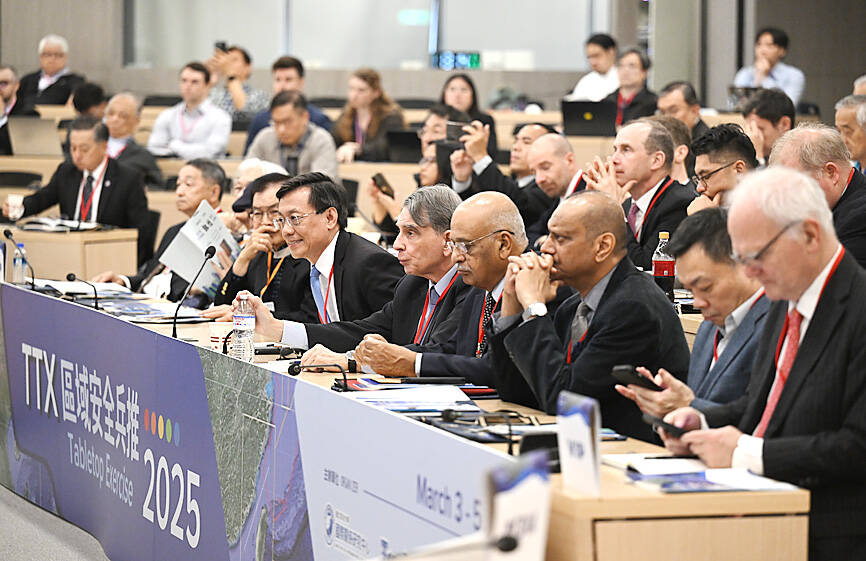A tabletop exercise series has begun simulating possible scenarios if the Chinese People’s Liberation Army (PLA) launched a war against Taiwan in the guise of a military exercise.
The exercise series is jointly organized by National Chengchi University’s Institute of International Relations, Taiwan Center for Security Studies and Asia-Pacific Policy Research Association.
Chinese Nationalist Party (KMT) Legislator Chen Yeong-kang (陳永康), former American Institute in Taiwan (AIT) director William Stanton and Taiwan Center for Security Studies director Liu Fu-kuo (劉復國) attended the event in Taipei yesterday.

Photo: Lin Cheng-kun, Taipei Times
Scenarios that would be simulated include changing political circumstances in the US during US President Donald Trump’s tenure and the PLA’s “gray zone” harassment around Taiwan, such as damaging submarine cables, Liu told reporters.
The series would simulate how people in Taiwan should respond in terms of military, national security, diplomacy and economy if a PLA military exercise turned into an invasion, Liu said.
Despite a rise in cross-strait tensions, the likelihood of China launching an invasion remains low, Liu said, adding that proactive military actions from China are generally launched in coordination with its political moves.
Beijing’s recurring military exercises do not necessarily mean that it would launch an all-out invasion of Taiwan, Chen said.
“Instead they are a strategic act designed to intimidate Taiwanese, put constant pressure on the nation and engage in an attritional battle” to drain its resources, he said.
Chen said that the purpose of the exercise series is to identify strategies for the government to implement to control risks and prevent war, adding that Taiwan’s social resilience and military defense capabilities should also be bolstered.
Stanton said former president Tsai Ing-wen’s (蔡英文) decision to restore mandatory military service to one year was the right one, but it would be more appropriate to extend it to two-years of service given the potential threat facing Taiwan.
“We hope to see a stronger Taiwanese military and less political division ... Now is not the time for politics,” he said.
Taiwan should take advantage of its status in the semiconductor industry and win over support from other countries, Stanton said.
Asked if Taiwan would be in a situation similar to that of Ukraine, Stanton said that US Secretary of State Marco Rubio has expressed strong support for Taiwan, while Trump refused to say explicitly what he would do in a cross-strait conflict.
Trump understands that he would have to handle his relations with Chinese President Xi Jinping (習近平) and has strategic considerations, he said, adding that a free and democratic Taiwan is worth the support from the US.
Regarding how to learn from the Ukrainian military, Chen said what worked for Ukraine might not work for Taiwan, but it should learn from the failures of the Ukrainian military.
Seeing how the US and Ukraine interacted should remind Taiwan to bolster its own capabilities in handling cross-strait conflicts, he said.
“Not only must we maintain our relations with the Trump administration, but we must strive to pursue peace and stability across the Taiwan Strait,” he said.

‘DENIAL DEFENSE’: The US would increase its military presence with uncrewed ships, and submarines, while boosting defense in the Indo-Pacific, a Pete Hegseth memo said The US is reorienting its military strategy to focus primarily on deterring a potential Chinese invasion of Taiwan, a memo signed by US Secretary of Defense Pete Hegseth showed. The memo also called on Taiwan to increase its defense spending. The document, known as the “Interim National Defense Strategic Guidance,” was distributed this month and detailed the national defense plans of US President Donald Trump’s administration, an article in the Washington Post said on Saturday. It outlines how the US can prepare for a potential war with China and defend itself from threats in the “near abroad,” including Greenland and the Panama

A wild live dugong was found in Taiwan for the first time in 88 years, after it was accidentally caught by a fisher’s net on Tuesday in Yilan County’s Fenniaolin (粉鳥林). This is the first sighting of the species in Taiwan since 1937, having already been considered “extinct” in the country and considered as “vulnerable” by the International Union for Conservation of Nature. A fisher surnamed Chen (陳) went to Fenniaolin to collect the fish in his netting, but instead caught a 3m long, 500kg dugong. The fisher released the animal back into the wild, not realizing it was an endangered species at

The Chinese Nationalist Party (KMT) is maintaining close ties with Beijing, the Democratic Progressive Party (DPP) said yesterday, hours after a new round of Chinese military drills in the Taiwan Strait began. Political parties in a democracy have a responsibility to be loyal to the nation and defend its sovereignty, DPP spokesman Justin Wu (吳崢) told a news conference in Taipei. His comments came hours after Beijing announced via Chinese state media that the Chinese People’s Liberation Army’s Eastern Theater Command was holding large-scale drills simulating a multi-pronged attack on Taiwan. Contrary to the KMT’s claims that it is staunchly anti-communist, KMT Deputy

The High Prosecutors’ Office yesterday withdrew an appeal against the acquittal of a former bank manager 22 years after his death, marking Taiwan’s first instance of prosecutors rendering posthumous justice to a wrongfully convicted defendant. Chu Ching-en (諸慶恩) — formerly a manager at the Taipei branch of BNP Paribas — was in 1999 accused by Weng Mao-chung (翁茂鍾), then-president of Chia Her Industrial Co, of forging a request for a fixed deposit of US$10 million by I-Hwa Industrial Co, a subsidiary of Chia Her, which was used as collateral. Chu was ruled not guilty in the first trial, but was found guilty